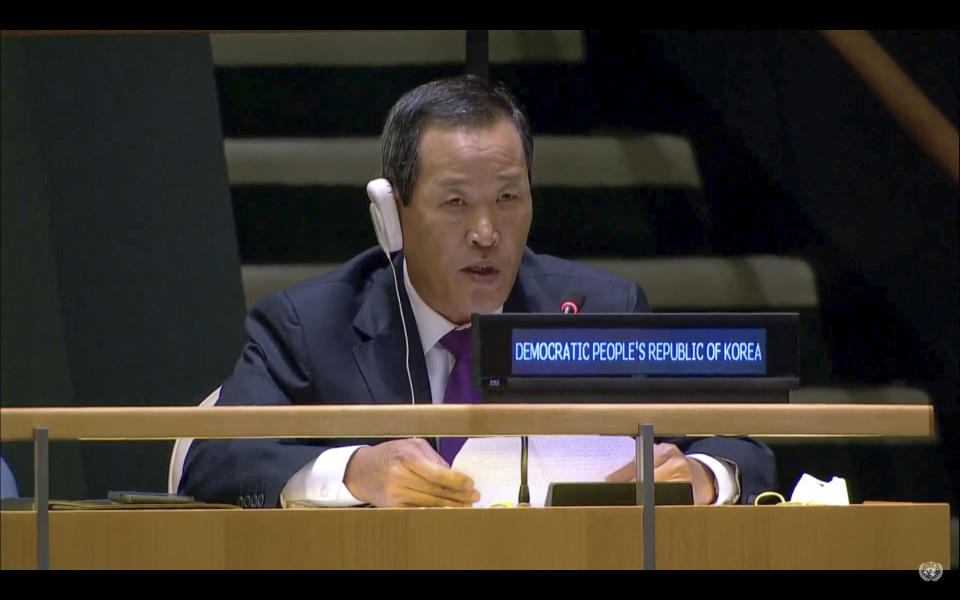North Korea on virus threat: 'Under safe and stable control'
North Korea on Tuesday called on the world's governments to “display effective leadership” in the fight against COVID-19 and said its own measures against the pandemic, which it called “preemptive, timely and strong,” ensured it had the threat “under safe and stable control."
Kim Song, the country's U.N. ambassador, said a tightly administered anti-pandemic effort in his nation had been working. North Korea strictly regulates foreign visitors — even more so during the pandemic that's killed more than 1 million people worldwide — and filters all information through its state propaganda apparatus, with details about its approach to the coronavirus relatively scant.
"(The) anti-epidemic situation in our country is now under safe and stable control,” the ambassador said in a rare live address at the U.N. General Assembly.
“A series of state measures are now being taken to block the virus inflow into the country, and all people adhere strictly to anti-epidemic regulations while maintaining the highest alert,” he said.
Further, Kim said the government “will not tolerate even a smallest bit of slackness or concession, but further strengthen the state emergency anti-epidemic measures until the danger of the pandemic inflow is completely eliminated."
Until Tuesday, all speeches at the U.N. General Assembly over the past week were virtual, delivered by world leaders in prerecorded videos from their home nations. The meeting concluded with a smattering of speeches by officials based at the United Nations — including Kim.
North Korean state media later reported the nation's leader Kim Jong Un had presided over a meeting of the ruling Workers’ Party’s Politburo on Tuesday. The Korean Central News Agency said officials during the meeting warned against complacency and addressed unspecified problems in the country’s anti-virus campaign while discussing ways to maintain a “streel-strong anti-epidemic system.”
North Korea has steadfastly said there hasn’t been a single virus case on its territory, a claim widely disputed by foreign experts.
Kim Song did not mention U.S. President Donald Trump or the United States directly in his speech. But he spoke of “the maneuvers of hostile forces” — a frequent euphemism for the United States and South Korea — and condemned the U.S. trade embargo against Cuba as “economic genocide.”
Kim Jong Un, the third generation of his family to rule the nation, had not been expected to address the U.N. this year. Kim Song also addressed the General Assembly last year.
Trump and Kim Jong Un have met three times in high-stakes nuclear diplomacy that has largely stalled since their second meeting in February 2019, where the Americans rejected North Korea’s demands for major sanctions relief in exchange for a piecemeal deal toward partially surrendering its nuclear capabilities.
The North in recent months has stated it would never again gift Trump with high-profile meetings he could boast of as foreign policy achievements unless it gets something substantial in return. Most experts say North Korea is likely to avoid serious negotiations with the Trump administration before the November presidential election because there's a chance U.S. leadership could change.
Kim Song also peppered his speech Tuesday with familiar themes about the country being continually under nuclear threat, which it has long cited as the basis for its pursuit of its own nuclear weapons. "In the present world, where high-handedness based on strength is rampant, genuine peace can only be safeguarded when one possesses the absolute strength to prevent war itself," the U.N. ambassador said.
Kim Jong Un is struggling to keep afloat an economy ravaged by chronic mismanagement, U.S.-led sanctions over his nuclear weapons program, the pandemic and devastating summer floods that will likely worsen food shortages.
In a glimpse into some of those struggles against natural calamity, Kim Song said, "Although we suffered considerable losses due to unexpected natural disasters this year, we are vigorously striving to remove the flood and typhoon damages by ourselves and stabilize the people’s life in a short period of time."
In August, Kim Jong Un showed unusual candor by acknowledging his economic improvement plans have fallen short, as the ruling Workers’ Party scheduled a congress in January to set development goals for the next five years.
It’s possible Kim could use the congress, which would take place after the U.S. election, to announce a new foreign policy approach toward Washington and Seoul, experts say.
___
Kim Tong-hyung covers the Koreas from Seoul for The Associated Press. Ted Anthony was AP's Asia-Pacific news director from 2014 to 2018.



